Positive Ocean News in 2022
POSITIVE OCEAN NEWS IN 2022
ORCA Sci-Comm Team | 29th December 2022
As marine conservationists, we often see and feel eco-anxiety, climate doom, and environmental existential dread. In the midst of climate and nature crises, there's a lot to worry about, but when hopelessness becomes the dominant emotion, apathy creeps in. NGO’s have a huge part to play in combatting climate doom, and that’s why ORCA Ireland have started the new “Blue Mind Project”. We must be honest and accurate in our reporting, not downplaying the severity of the situation or greenwashing the truth. It's also our job to show that there is hope!
We will be tracking this year's positive environmental stories as part of our ongoing efforts to reduce eco-anxiety (both our readers' and our own). The ORCA Ireland blog will be updated regularly with the latest good news. It may be something small and local, something silly that cheers us up, or something large and potentially world-changing.
Please reach out to us on social media, either on Instagram or Twitter, if you come across a great, positive story you would like us to cover.

COP15 reaches landmark biodiversity agreement
At the UN biodiversity conference in Montreal, Canada, a historic deal was made for nature. This is the largest effort yet to protect land and oceans of the world and provide funding to ensure biodiversity is not lost in developing countries. The UN biodiversity conference, COP15, has been dubbed the "last chance" to save nature.
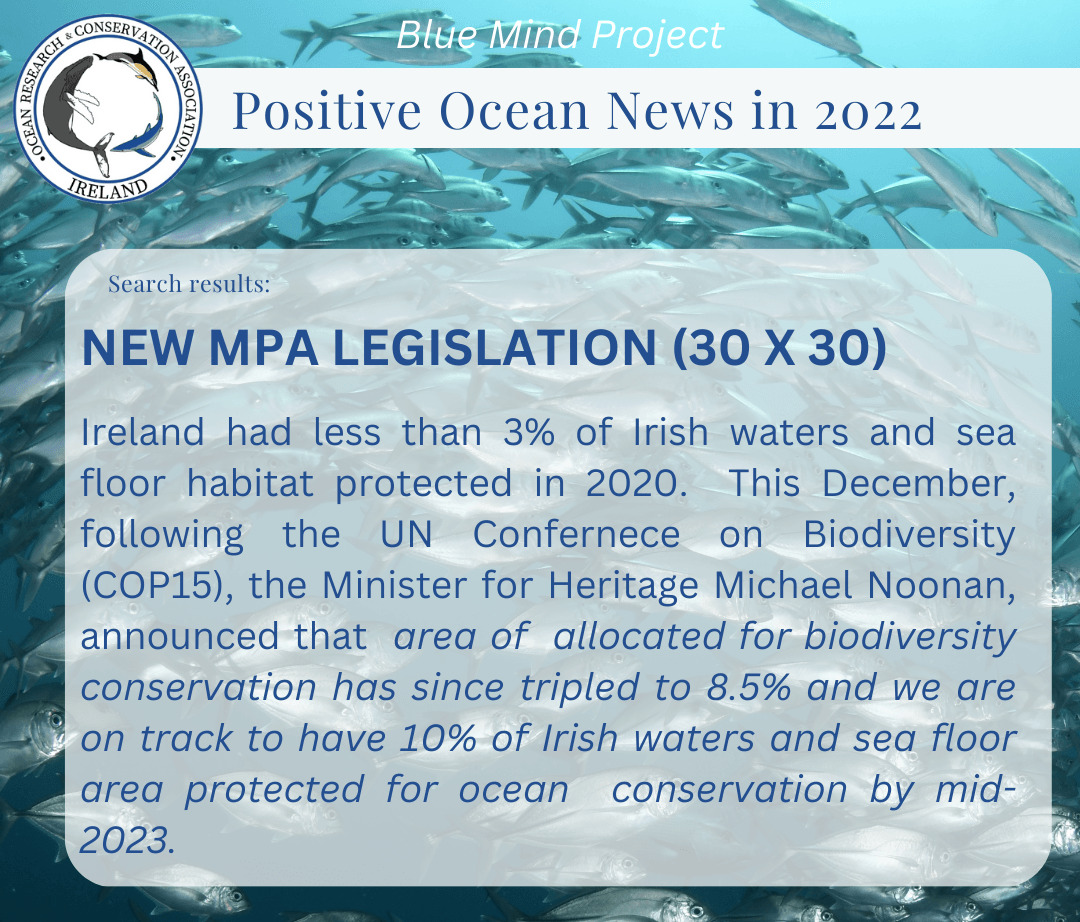
Two New Offshore Marine Protected Areas.
The Irish Government have announced the designation of two new Marine Protected Areas (MPAs), covering almost 3 million hectares off the north west and south-east coasts of Ireland. ORCA Ireland support the conservation of the high seas and offshore marine habitats and believe this is a small step for mankind but a huge step for Ireland in the right direction. The recent good news, will protect the Southern Canyons 280km from Cork and Kerry alongside the Porcupine Shelf, west of Clew Bay Mayo will increase the country’s MPAs to 8.3%. It includes diverse coral reefs that are home to many fish species as well as arctic terns and puffins, in addition to marine mammals and shark species. With the designation of two new MPAs, the area of reef habitat in Ireland has increased from 10% to 24%.
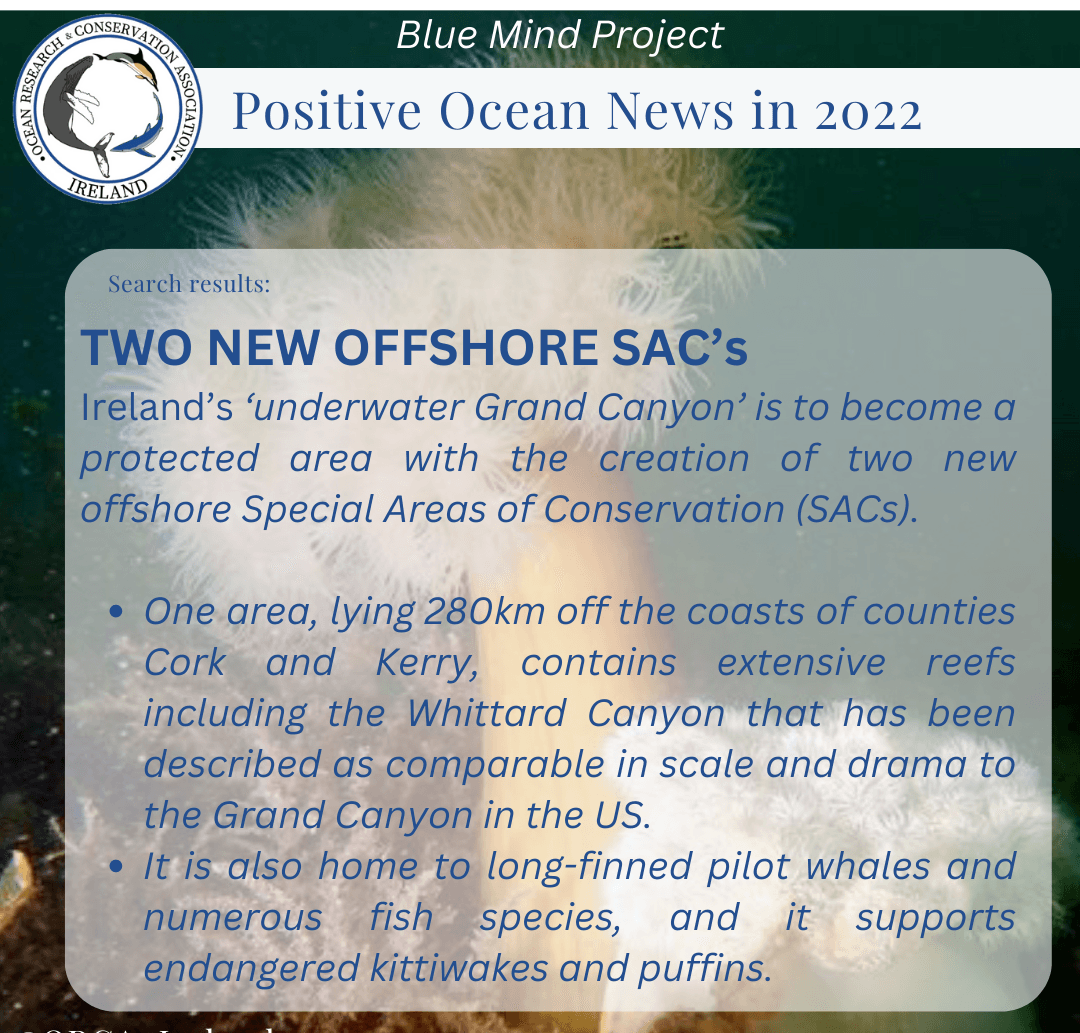
142 Million Euro EU Funding for Irish Fisheries
In terms of programme allocation, 50% will go towards sustainable fisheries and conservation of aquatic biological resources, 36% will go to sustainable aquaculture, processing and marketing, 6% will go into sustainable blue economies in coastal areas and 2% will go into strengthening international ocean governance, all contributing to the EU's environmental and climate goals.
Program objectives include:
- Sustainable fisheries: investments to build resilience of the fishery sector to the current challenges; energy efficiency and reduce carbon emissions in the fishing fleet; on-board and on-shore investments to comply with the landing obligation; investments in fishing vessels to improve health, safety and working conditions on board; action to develop skills in the seafood sector; support to control and data collection activities; actions to reduce marine litter; actions to support marine biodiversity, including the designation and management process of Natura 2000 sites and marine protected areas.
- Sustainable aquaculture and processing of fisheries and aquaculture products: research and innovation; investments in sustainable aquaculture, including developing cultivation techniques that support biodiversity; actions to increase the competitiveness of the processing sector; energy efficiency and decarbonisation in aquaculture and the processing sector; actions tackling marine litter and applying circular economy principles in the aquaculture and processing sectors.
- Sustainable blue economy (i.e. economic activities related to seas and oceans): development and economic diversification of coastal and island areas through Local Action Groups (LAG).
- International ocean governance: strengthening sustainable sea and ocean management through the promotion of marine knowledge, including improved understanding of the impacts of human activities and climate change on the environment and their cumulative effects.

New Protection for Basking Sharks
Basking sharks are now a protected species under new Irish law. In October 2022, it became illegal to hunt, injure or interfere with the globally threatened species in Ireland's marine areas under the 1976 Wildlife Act. Known as the second largest shark in the world, basking sharks can reach a length of 12 metres. Rather than feasting on seals and other fish, they use their mouths and large 'gill rakers' to catch microscopic zooplankton. Children signed a petition urging leaders to protect the once heavily fished species, which led to its new status in Ireland.
Basking sharks are protected under Section 23 of the Act, and it is an offence to:
• Hunt a protected wild animal (unless under permission or licence granted by the Department)
• Injure a protected wild animal (unless done while hunting in accordance with a licence or exemption cited above), or
• Wilfully interfere with or destroy the breeding or resting places of a protected wild animal.
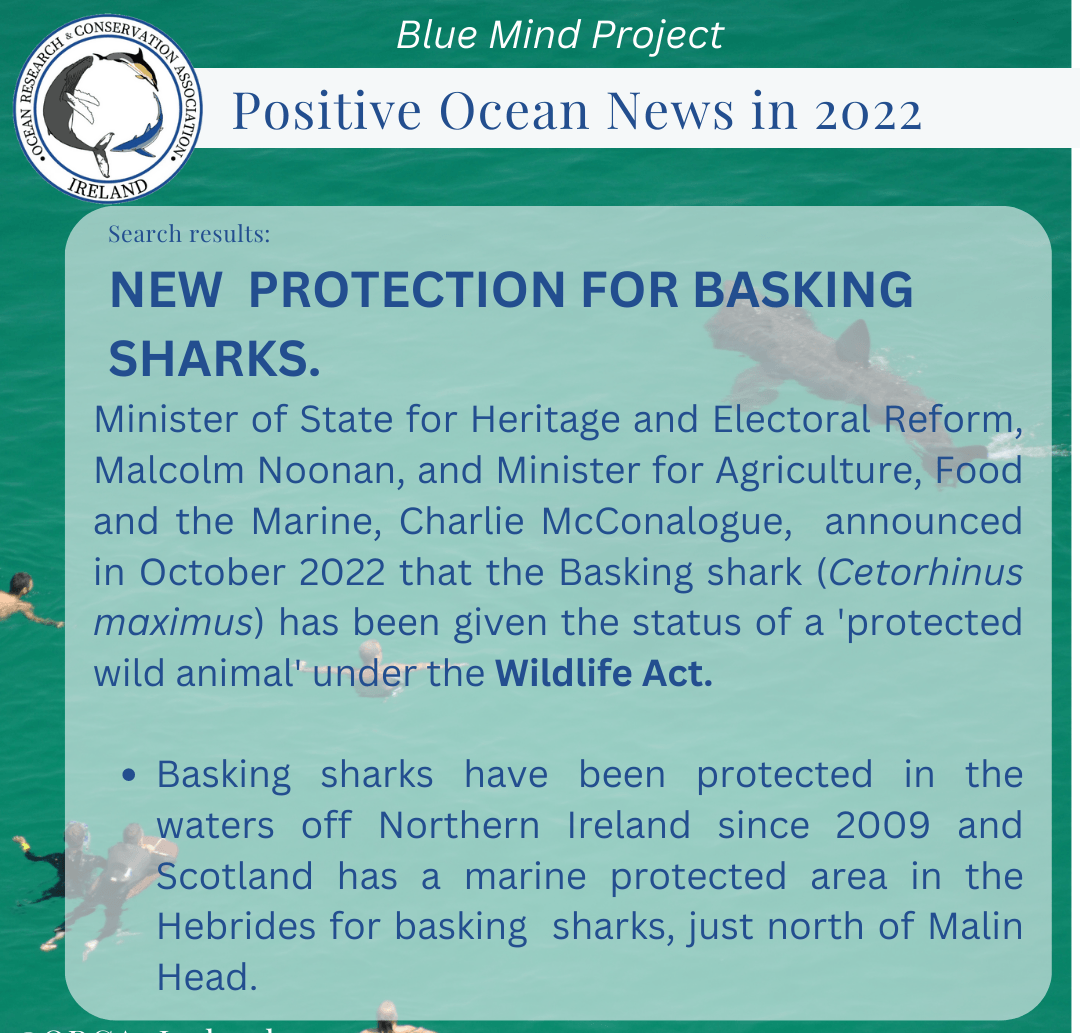
Irish Fishermen Disrupt Russian Naval Exercises
A fishing community in southern Ireland breathed a sigh of relief this weekend after the Russian government backed down after local fishermen appealed to them about how naval drills ordered by Moscow off the Irish coast might threaten their livelihoods. Approximately 150 miles off the Irish coast, in Ireland's Exclusive Economic Zone, Moscow's armed forces planned to conduct exercises. Among the exercises was the use of naval artillery and rocket launches, according to a notice issued by Ireland's Department of Transport last week, which said there were "serious safety risks in the operational area.” Prior to the planned drills, which were originally scheduled for early February, Irish fishermen met with Yuri Filatov, Russian Ambassador to Ireland, and told the Russians they planned on fishing regardless of the naval activities. After a feverish 48 hours or so” of negotiations between Dublin and Moscow, it was announced that the exercises would be moved as “a gesture of good will”, and the Russian navy moved off.
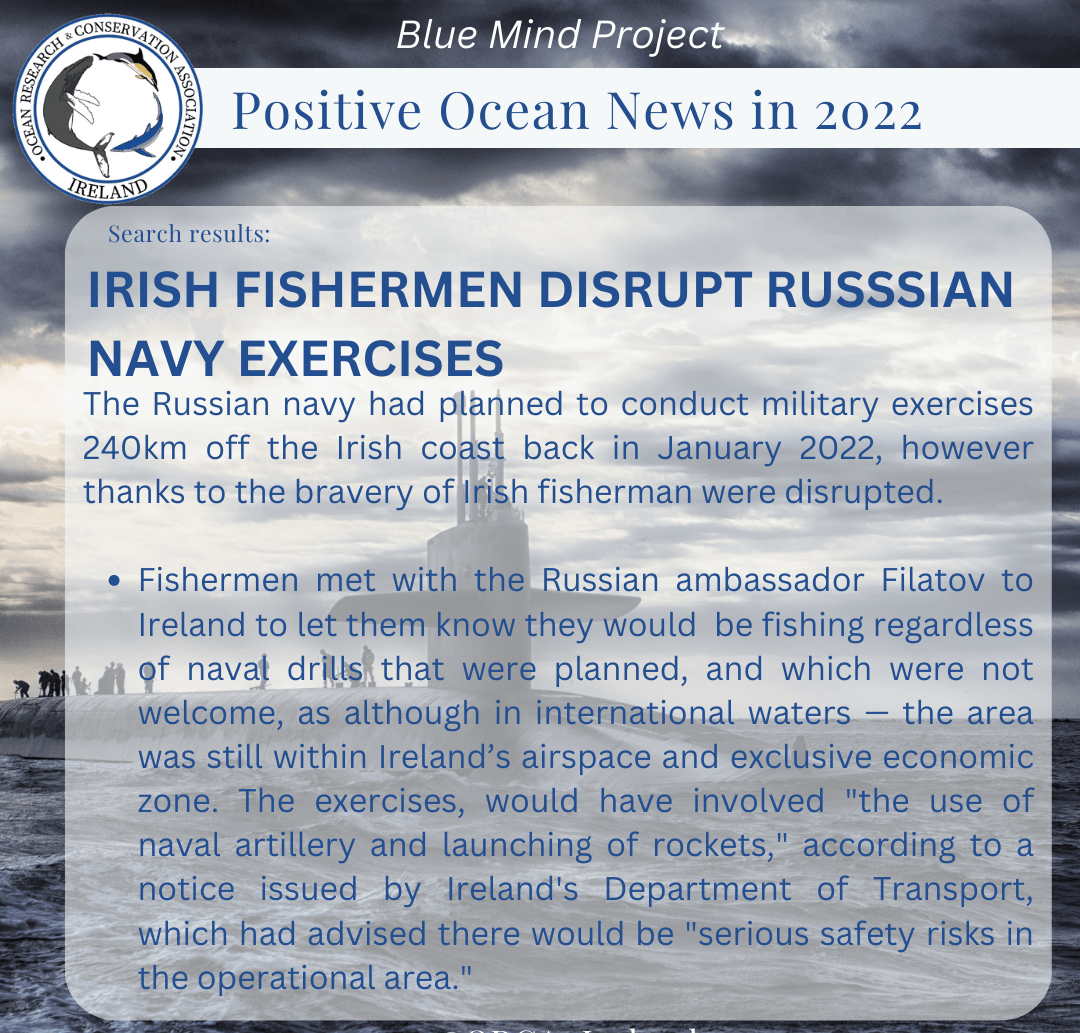
Flying Electric Ferry for Northern Ireland
It is expected that Belfast and Bangor in Northern Ireland will soon be connected by one of the world's most advanced electric passenger ferries. Underwater wings will lift up like plane wings as the vessel flies over the water at a top speed of 69 kilometres per hour. Designed to reduce seasickness and shoreline damage, these ships can carry up to 150 passengers. Compared with conventional diesel-powered ferries, the designers say raising the hull above water reduces drag, resulting in fuel savings of up to 85 percent. As a result of the "unique" high-speed collision avoidance system, the vessels will also avoid hitting marine animals. According to the makers, they will follow "an altered path away from sea life, wildlife, debris, and other objects in the water". It will take 25 minutes for these new vessels to make the crossing from Belfast to Bangor in Northern Ireland. The pilot scheme will be run by Artemis Technologies in partnership with Condor Ferries in 2024. The launch of the first ferry will create 125 jobs, and that number could rise to 1,000 over the next ten years as more services are launched.
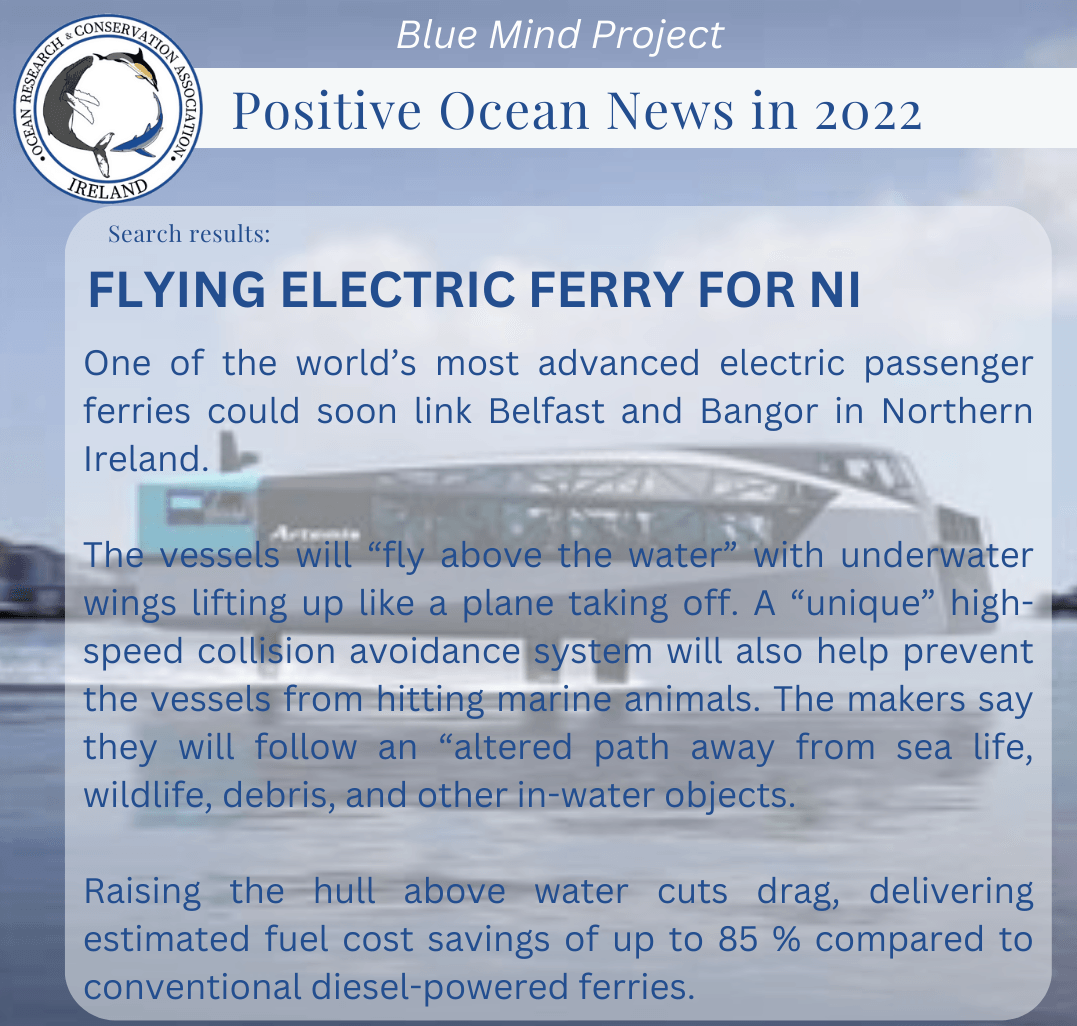
SHARE THIS ARTICLE













